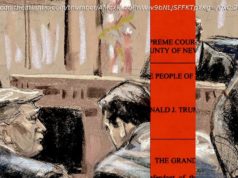If anything, it showed the Mueller investigation is on the right track.
To quote former FBI Director James Comey: That’s it? After an inexcusable buildup, House Republicans have released a memo purporting to show that the Department of Justice investigation into Russian interference in the 2016 presidential election was tainted by partisanship. Instead, the memo reveals that the investigation is legitimate — and vitally necessary.
The memo, released with the blessing of Speaker Paul Ryan and President Donald Trump but over the objections of the Federal Bureau of Investigation and the Justice Department, expresses «concerns» over government interactions with the Foreign Intelligence Surveillance Court, which must approve any FBI effort to surveil U. S. citizens. It further raises the specter of a «troubling breakdown of legal processes» in the surveillance approval process.
But, to quote Comey again, these claims are dishonest and misleading. They are also refuted by the memo itself.
Its «proof» of partisan bias is the so-called Steele dossier, which the court partly relied on to grant the surveillance request (other information on which the court relied is classified). Yes, the dossier was funded by Democrats, and the memo asserts the FBI failed to inform the court of this. But the ranking Democrat on the House Intelligence committee disputes that claim, which may be among the reasons why Ryan has so far forbidden him from releasing his own memo.
In any case, legally speaking, the information’s provenance is less relevant than its reliability. Judges have a lot of practice assessing information from biased informants, who after all are the most common kind.
Even worse, the memo undercuts its own case by conceding that the surveillance requests originated with information that had nothing to do with the dossier. The target of the surveillance, onetime Trump foreign policy adviser Carter Page, had attracted FBI notice for his interaction with Russian agents as far back as 2013. The memo notes that the FBI’s counterintelligence investigation began in July 2016, before it knew of the Steele dossier.
Of course, the memo’s larger aim — discrediting the investigation — becomes even more difficult when viewed in context. It’s hard to argue that an investigation is a partisan Democratic ruse when it’s run by a Republican special counsel who was appointed by Trump’s own Justice Department.
The real trouble, of course, is not that the investigation is based on anything biased or bogus. It’s that it appears all too legitimate. It has already produced two guilty pleas, including one from the former national security adviser, and two indictments, including one of the president’s former campaign chairman.
The guilty pleas and indictments show special counsel Robert Mueller is on the right track. Congress’s focus now should be on ensuring that he be allowed to complete his investigation.
—Editors: Francis Wilkinson, Michael Newman.
To contact the senior editor responsible for Bloomberg View’s editorials: David Shipley at
davidshipley@bloomberg.net
.






